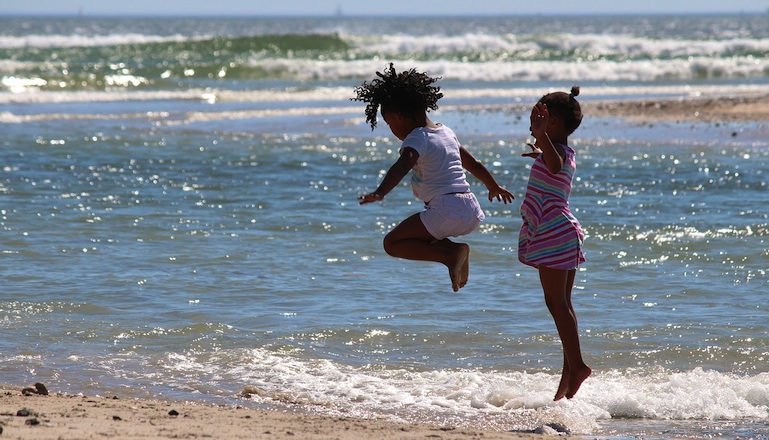We initially fell in love with a smiling photo of a little girl, Nanah, whom my husband, Alan, and I were sponsoring through our adoption agency. When we learned it might be possible to adopt her, we knew it was risky because of the war and political situation in Sierra Leone. But it was clear to us that she needed us more than any other child we might adopt. We decided to adopt a second child from the same orphanage, Isatu, at the same time.
When we first heard about our daughters, they were living in an orphanage in Sierra Leone. Later, they were forced to flee into the countryside during a period of intense fighting. After a 90-mile trek through their war-torn country, all 17 children from the orphanage, along with their caregivers, arrived safely at a refugee camp.
A Life of Loss
Even before their harrowing journey, the girls had had the sorrow of losing their families, had felt the pangs of starvation, and had been witnesses to unspeakable violence—the extent of which we cannot imagine. They had lived in constant fear.
The girls were reportedly seven and eight years old when we met them. Initially the emotional burden was heavy. I realized that most of their medical reports were fictitious—it was clear the resources for testing were not available. We spent our first few months at home visiting doctors and specialists for various tests. We were relieved that they were hepatitis- and HIV-negative—although waiting for these results caused many sleepless nights.
The real illnesses that plague my children cannot be seen on the skin or measured by a bone or a blood test. After a fire drill at her new school, Isatu confided to me, “Dead people burned look icky.” Nanah can describe people being killed in front of her. I initially tried to protect them from scary themes on television, but after Isatu saw The Wizard of Oz in school, she scoffed and said, “That’s not how dead people look—they have flies on them!”
Isatu has told us how her entire family was shot to death in front of her and how she ran away, narrowly escaping the same fate. She prays for her family frequently. One night during dinner, Nanah became catatonic, overcome with fear at the sound of bass vibrations from a stereo in a car out on the street. She had mistaken the noise for impending bombs. Afraid to go into her room to bed, she clung to me inconsolably all night. “I scared, Mama! Bad people!” is all she could say.
Our family went through a period of depression, now happily behind us. I worried that Nanah and Isatu had suffered irreparable harm. How would their issues affect our two-year-old daughter, Madison? Most people, including those in our extended family, were boggled by the intensity of our situation, so we did not have a large support base.
Both girls have begun treatment for post-traumatic stress, and they continue in weekly therapy, a life-saving treatment for them and for all of us. With help, they are fighting their demons.
A Life of Promise
We have been a family for two years now. How have we weathered this? Although the adoption of refugee children was more complicated than I expected, it has been infinitely rewarding. These children and their past are now part of me. I love them unconditionally, and although I want to erase the past my children have lived and the terrible burdens they carry, I know I cannot.
Our daughters have made great progress. They are loving and warm, and our fears of aggressiveness were unfounded. They have real strength of character and an incredible will to survive. Although I slept with the girls at the beginning because of their fears and nightmares, now they sleep peacefully through the night. The girls no longer dive for cover when they hear an airplane or see a policeman in uniform. Their command of English is impressive. One is excelling academically, the other making steady progress.
Isatu and Nanah have strong ties to their home country and culture, and a sense of responsibility to the children there whose lives remain in danger. It helps them to know that our family is sponsoring a little girl named Menah, who remains in Sierra Leone awaiting a family. They have a strong social conscience and this year made Easter baskets for all of the children in a local women and children’s shelter where they frequently volunteer. They have also developed a taste for sweets, trendy clothes, computers, and Britney Spears music!
Looking back, we have made an amazing journey. Our girls are vivacious, happy, and well-adjusted. I can laugh now at our struggles to learn to take care of African hair (seven hours in a braiding salon, learning about treatment, oils, relaxers!). Integrating African children into our predominately white society continues to be a challenge. I have learned more about racism in the last two years than I ever imagined. These challenges are minor compared to the great joy, inspiration, and strength our daughters have given us—our lives have been changed in a miraculous way. Knowing them has helped redirect my own approach to life. I can’t imagine my life without them. It brings tears of joy to my eyes to hear them say, “Mama, we love you.”



